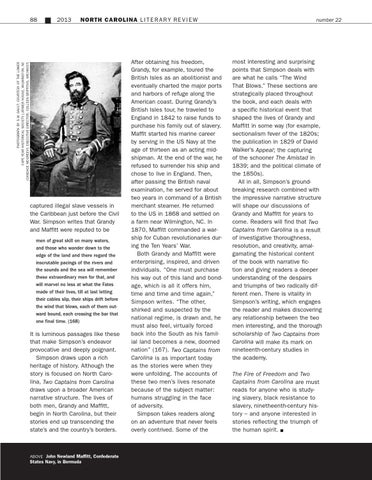2013
NORTH CAROLINA L I T E R A R Y RE V I E W
Photograph by S.W. Gault; Courtesy of the Lower Cape Fear Historical Society, Latimer House, Wilmington, NC (Candace McGreevy, executive director; Colleen Griffiths, archivist)
88
captured illegal slave vessels in the Caribbean just before the Civil War. Simpson writes that Grandy and Maffitt were reputed to be men of great skill on many waters, and those who wander down to the edge of the land and there regard the inscrutable pacings of the rivers and the sounds and the sea will remember these extraordinary men for that, and will marvel no less at what the Fates made of their lives, till at last letting their cables slip, their ships drift before the wind that blows, each of them outward bound, each crossing the bar that one final time. (168)
It is luminous passages like these that make Simpson’s endeavor provocative and deeply poignant. Simpson draws upon a rich heritage of history. Although the story is focused on North Carolina, Two Captains from Carolina draws upon a broader American narrative structure. The lives of both men, Grandy and Maffitt, begin in North Carolina, but their stories end up transcending the state’s and the country’s borders.
above John Newland Maffitt, Confederate States Navy, in Bermuda
After obtaining his freedom, Grandy, for example, toured the British Isles as an abolitionist and eventually charted the major ports and harbors of refuge along the American coast. During Grandy’s British Isles tour, he traveled to England in 1842 to raise funds to purchase his family out of slavery. Maffit started his marine career by serving in the US Navy at the age of thirteen as an acting midshipman. At the end of the war, he refused to surrender his ship and chose to live in England. Then, after passing the British naval examination, he served for about two years in command of a British merchant steamer. He returned to the US in 1868 and settled on a farm near Wilmington, NC. In 1870, Maffitt commanded a warship for Cuban revolutionaries during the Ten Years’ War. Both Grandy and Maffitt were enterprising, inspired, and driven individuals. “One must purchase his way out of this land and bondage, which is all it offers him, time and time and time again,” Simpson writes. “The other, shirked and suspected by the national regime, is drawn and, he must also feel, virtually forced back into the South as his familial land becomes a new, doomed nation” (167). Two Captains from Carolina is as important today as the stories were when they were unfolding. The accounts of these two men’s lives resonate because of the subject matter: humans struggling in the face of adversity. Simpson takes readers along on an adventure that never feels overly contrived. Some of the
number 22
most interesting and surprising points that Simpson deals with are what he calls “The Wind That Blows.” These sections are strategically placed throughout the book, and each deals with a specific historical event that shaped the lives of Grandy and Maffitt in some way (for example, sectionalism fever of the 1820s; the publication in 1829 of David Walker’s Appeal; the capturing of the schooner The Amistad in 1839; and the political climate of the 1850s). All in all, Simpson’s groundbreaking research combined with the impressive narrative structure will shape our discussions of Grandy and Maffitt for years to come. Readers will find that Two Captains from Carolina is a result of investigative thoroughness, resolution, and creativity, amalgamating the historical content of the book with narrative fiction and giving readers a deeper understanding of the despairs and triumphs of two radically different men. There is vitality in Simpson’s writing, which engages the reader and makes discovering any relationship between the two men interesting, and the thorough scholarship of Two Captains from Carolina will make its mark on nineteenth-century studies in the academy. The Fire of Freedom and Two Captains from Carolina are must reads for anyone who is studying slavery, black resistance to slavery, ninetheenth-century history – and anyone interested in stories reflecting the triumph of the human spirit. n
